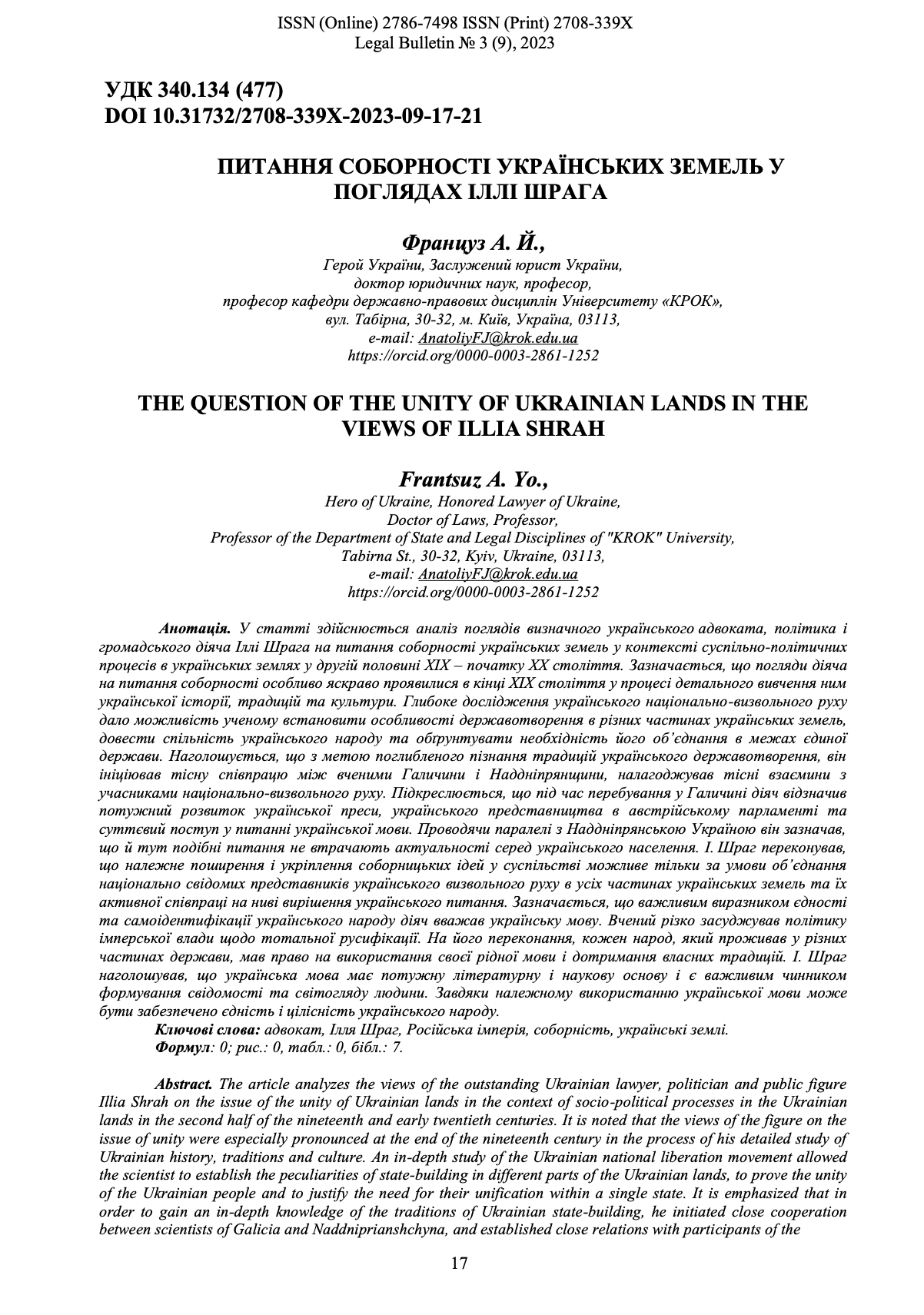THE QUESTION OF THE UNITY OF UKRAINIAN LANDS IN THE VIEWS OF ILLIA SHRAH
DOI:
https://doi.org/10.31732/2708-339X-2023-09-17-21Keywords:
lawyer, Ilya Shrag, Russian Empire, cathedralism, Ukrainian lands.Abstract
In the article analyzes the views of the prominent Ukrainian politician, lawyer and public figure Ilya Shrag on the issue of confraternity in the context of socio-political processes in Ukrainian lands in the second half of the 19th and early 20th centuries. It is noted that the activist's views on the issue of conciliarism were especially vividly manifested at the end of the 19th century in the process of his detailed study of Ukrainian history, traditions and culture. An in-depth study of the Ukrainian national liberation movement gave the scientist the opportunity to establish the peculiarities of state formation in different parts of the Ukrainian lands, to prove the unity of the Ukrainian people and to substantiate the need for their unification within the boundaries of a single state. It is emphasized that with the aim of in-depth knowledge of the traditions of Ukrainian state-building, he joined forces with scientists from both Galicia and Transnistria, established close relations with the participants of the national liberation movement. It is emphasized that during his stay in Galicia, the activist noted the powerful development of the Ukrainian press, the Ukrainian representation in the Austrian parliament, and significant progress in the Ukrainian language issue. Drawing parallels with Dnieper Ukraine, he noted that similar issues do not lose their relevance among the Ukrainian population. I. Shrag convinced that the proper spread and strengthening of Sobornitsky ideas in society is possible only under the condition of unification of nationally conscious representatives of the Ukrainian liberation movement in all parts of Ukrainian lands and their active cooperation in the field of solving the Ukrainian question. It is noted that the activist considered the Ukrainian language an expression of the unity and self-identification of the Ukrainian people. The scientist sharply condemned the policy of the imperial authorities regarding total russification in the state. According to his belief, every people who lived in different parts of the state had the right to use their native language and observe their own traditions. I. Shrag emphasized that the Ukrainian language has a powerful literary and scientific basis and is an important factor in the formation of a person's consciousness and worldview. Thanks to the proper use of the Ukrainian language, the unity and integrity of the Ukrainian people can be ensured.
References
Зіневич Л. Мовозахисна діяльність Іллі Шрага // Культура слова. 2017. Вип. 86. С. 251-259.
І. Л. Шраг: документи і матеріали. Упор. В. М. Шевченко, Т. П. Демченко, В. І. Онищенко. Чернігів, 1997. 166 с.
Катренко А. М., Катренко Я. А. Їх об’єднували сповідувані демократичні ідеали та любов до України і її народу (Листи І. Л. Шрага М. С.Грушевському). К.: [б. в.], 2009. 64 с.
Кузьменко Н. М. Ілля Шраг про рідну мову як засіб формування особистості українського громадянина // Актуальні проблеми соціології, психології, педагогіки. 2012. Вип. 15. С. 200-206.
Левченко І. К., Котляр О. А., Кухарук У. Р., Сморжевська О. О. Поняття «соборності» та «рідної мови» у контексті українського національного відродження (на прикладі світоглядів Олександра Кониського та Іллі Шрага) // Іван Огієнко і сучасна наука та освіта: науковий збірник : серія історична / редкол.: С. А. Копилов (гол. ред.), О. М. Завальнюк (відп. ред.) та ін.. Кам’янець-Подільський : Кам’янець-Подільський національний університет імені Івана Огієнка, 2018. Вип. ХІV. С. 145-154.
Шраг І. Л. Автобіографія // І. Л. Шраг. Документи і матеріали. Чернігів, 1997. С. 40-58.
Шраг І. Лист VІІ (Про науку в школах народних українською мовою) // І. Л. Шраг. Документи і матеріали / упор. В. М. Шевченко, Т.П. Демченко, В. І. Онищенко. Чернігів, 1997. С. 94-103.

Downloads
Published
How to Cite
Issue
Section
License
Copyright (c) 2023 А.Й. Француз

This work is licensed under a Creative Commons Attribution 4.0 International License.




